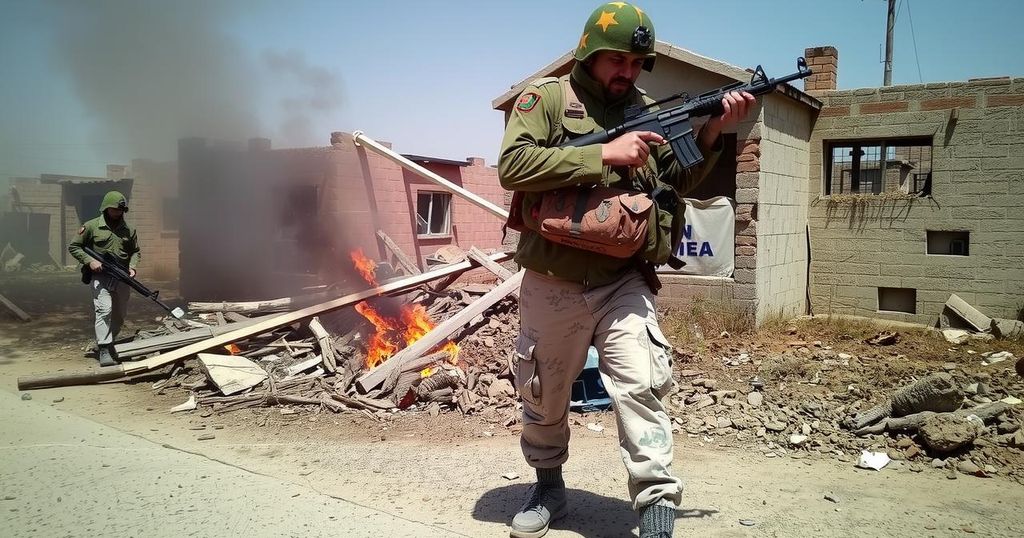The Gaza Strip is facing a severe humanitarian crisis exacerbated by violence from gangs targeting aid convoys and Israeli military operations against Hamas. Restrictions on aid have led to increased suffering among civilians, especially vulnerable populations like children. The UN and other organizations criticize Israel for failing to ensure the safe passage of aid, leading to heightened calls for action to meet international humanitarian obligations.
Lawlessness has become a distressing hallmark of daily life in the Gaza Strip, where gangs increasingly attack humanitarian aid convoys attempting to deliver essential supplies to the region. This alarming violence exacerbates the already dire humanitarian situation, heavily impacted by Israeli restrictions on aid entering Gaza. Consequently, many civilians are suffering from extreme cold, dehydration, and malnutrition, with winter conditions further amplifying the crisis, illustrated by the tragic deaths of infants from hypothermia.
While certain aid convoys are not intercepted by gangs, they are still at risk of Israeli airstrikes, as the military persists in its offensive against Hamas. Tom Fletcher, the UN Under-Secretary-General for Humanitarian Affairs, has expressed grave concerns regarding the deteriorating humanitarian landscape, highlighting that Gaza is currently among the most perilous places for aid delivery. Many humanitarian workers have recently lost their lives, making 2023 one of the deadliest years to date for this sector.
Despite international demands for improvements in the situation, UN and US officials have accused Israel of inadequately addressing the looting of aid convoys despite prior assurances to enhance access. Israel contends that it does not purposely restrict aid deliveries, asserting that Hamas often diverts these resources for its own gain. Recent Israeli government decisions to discontinue support for UNRWA, which aids over 2 million residents, have exacerbated the humanitarian crisis, as it illustrates a national security response rooted in distrust towards UN agencies.
Experts, such as Robert Blecher from International Crisis Group, have highlighted the potential for private contractors to provide aid under stricter security. However, significant concerns about such a move persist, including accountability and the potential perception of these contractors as occupying forces. International humanitarian law places considerable responsibility on Israel to protect the civilian population and ensure the provision of essential services, which many argue it is failing to uphold.
The staggering scale of looted aid—amounting to millions in October alone—highlights the severity of the situation in Gaza, where armed groups often commandeer humanitarian supplies under the noses of the authorities. Even allegations of Israeli involvement in attacks against aid convoys have surfaced, raising troubling questions about compliance with international humanitarian law. Reports indicate that the absence of law and order in Gaza has descended into chaos orchestrated by gangs and armed groups, illustrating a grim reality where humanitarian assistance is increasingly obstructed.
The humanitarian situation in the Gaza Strip continues to deteriorate amid ongoing conflict and violence. The struggle to deliver aid in this region has intensified due to both restrictions imposed by the Israeli government and the chaotic lawlessness enforced by local gangs. As winter conditions set in, the complications for vulnerable populations have escalated, often resulting in tragic outcomes for civilians, particularly children. This article assesses the current humanitarian efforts, the roles of different actors, and the implications of recent Israeli policies on aid deliveries.
In conclusion, the humanitarian situation in Gaza remains critical, marked by escalating violence against aid convoys and severe restrictions on humanitarian assistance. The assertions from various humanitarian organizations and legal experts underscore Israel’s obligations under international law to ensure the welfare of the civilian population within its control. The use of private contractors to deliver assistance raises questions about the approach to security and humanitarian principles, further complicating an already desperate scenario for the people of Gaza. Immediate and coordinated action is necessary to alleviate the suffering and restore order in the region.
Original Source: www.arabnews.com






